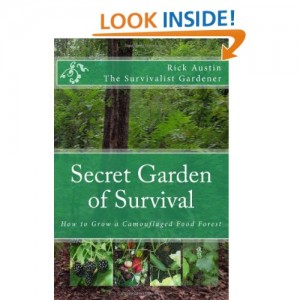
“Imagine a food garden that you only have to plant once in your life-time, that takes up very little space, that will provide food for the next 30 years; that can grow five times more food per square foot than traditional or commercial gardening; and where you never have to weed, never have to use fertilizers and never have to use pesticide– ever. All disguised as overgrown underbrush, so nobody knows you have food growing there! This book will show you how to do it in one growing season!”
From Mother Earth News:
“Rick Austin has not planted a garden in years, yet he plops 3 to 6 gallons of fresh-picked fruit and vegetables every day onto the kitchen counter for preparing or storing.
Often, Austin’s gathering binges prompt his wife to say, “Stop! I can’t keep up with you,” as she readies the harvest for dehydrating, canning or eating.
Outside their Appalachian off-grid home in North Carolina, the Austin’s carved out a completely natural, perpetual garden spot from the mature oak and pine forest. With the help of a hired bulldozer, in one afternoon they cleared a half acre right down to rock and red clay – the kind that turns to brick in hot, dry weather.
The Austins sold the hardwood, milled the pine for building materials and used the brush and rotted logs to construct berms for hillside terraces. Then, after all available soil was pushed into place, they began planting.
No straight, even, meticulously groomed rows of beans, corn and onions designate the area as a garden plot, however. In fact, whether from a distance or nearly atop the vegetation, it is almost impossible to realize a garden exists there at all.”
Read more at the source: Mother Earth News
Secret Garden of Survival on Amazon
Facebook
Secret Garden of Survival.com
From the book preview (reworded for brevity): This gardening method is based on studies of native indigenous people around the world who lived for generations without modern conveniences. These hunter/gatherers spent the majority of their time harvesting food without all the work that you would typically think of without traditional gardening.

Thanks Doc. I lived in N.C. back in the 70’s for a while. Looks like you’ve got me buying another book. I bought the one about alternative building and it IS a must read for anyone thinking of doing it “outside the box”. Savon Lecoulle (think that’s how you spell his name) is my favorite builder. Again, the east coast has a much different growing season than the north west so, I hope you or other readers can give me suggestions. Black berries are a troublesome plant up here but, I figure if I plant a plant or two inside a deep cement planter as I will do with my bamboo ( you well know that it grows like a weed) I should be able to enjoy both.
I found this interesting article about hunter gatherers while doing the research for the above blog post.
Original Affluent Society
Hunter-gatherers need only work about fifteen to twenty hours a week in order to survive.
“The “original affluent society” is a theory postulating that hunter-gatherers were the original affluent society. This theory was first articulated by Marshall Sahlins at a symposium entitled “Man the Hunter” held in Chicago in 1966. The significance of the theory stems from its role in shifting anthropological thought away from seeing hunter-gatherer societies as primitive, to seeing them as practitioners of a refined mode of subsistence.
At the time of the symposium new research by anthropologists, such as Richard B. Lee’s work on the !Kung of southern Africa, was challenging popular notions that hunter-gatherer societies were always near the brink of starvation and continuously engaged in a struggle for survival.[1] Sahlins gathered the data from these studies and used it to support a comprehensive argument that states that hunter-gatherers did not suffer from deprivation, but instead lived in a society in which “all the people’s wants are easily satisfied.”
These studies show that hunter-gatherers need only work about fifteen to twenty hours a week in order to survive and may devote the rest of their time to leisure.”
Wiki http://en.wikipedia.org/wiki/Original_affluent_society
While SOME groups of hunter-gatherers were undoubtedly living in an abundant location, allowing them time for leisure, other groups undoubtedly lived in more difficult conditions.
Just as people of today have an extremely wide variety of cultures, skills, and values depending upon the resources available where they live, ancient hunter gatherers no doubt had similar variances in their lifestyle.
Also, when a group found a particularly abundant area, they may not have needed to spend as much time getting food, but inevitably, they would need to spend more time defending that very prime area from others.
Leisure? I think not.
Just a different type of effort expended on different needs, more likely.